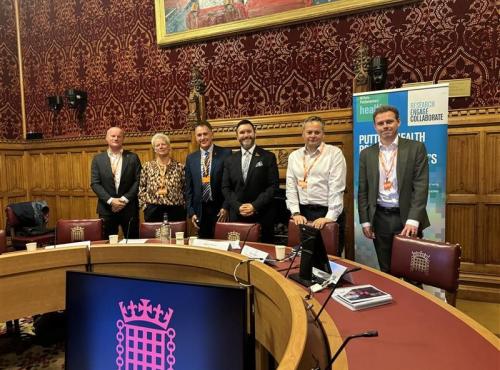Face Masks become mandatory - how this measure may hold the key to kickstarting our economy
From today, masks are mandatory in all shops and supermarkets in England. While lockdown is easing in almost all other respects, regarding masks, this step is the first new national restriction since enforcing masks on public transport last month.
It is hoped that the use of face coverings can help ease this transition back to the “new normal” and can support the kick starting of our economy. Even when we could go out restrictively during the initial phase of lockdown, there was no requirement for face-coverings – so what has changed? At Policy Connect, we have had the pleasure to be a part of the evolving of this policy discussion through our All Party Health Group parliamentary webinar series on COVID 19.
In a recent session, we heard from Prof Trish Greenhalgh (University of Oxford) on building future resilience to COVID. The evidence so far has shown that every single country that has introduced masking in public places has seen dramatic reduction in transmission rates. Wearing masks in a poorly ventilated enclosed space in particular, indicated towards a clear verdict in favour of wearing a mask. Prof Greenhalgh stressed that the “totality of evidence on mask-wearing is therefore important.”
Following the announcement, we caught up with Prof Greenhalgh again. As one of the main experts urging the adoption of face masks in public spaces, she said that she ‘very much welcomes this news’ and that ‘it made no sense to mandate face coverings on public transport while not requiring them in other crowded and poorly-ventilated indoor spaces such as shops and supermarkets’. She added that ‘masking is a symbolic practice [i.e. expressing social solidarity] as well as a public health intervention. My own team and also Melinda Mills in Demography (among many others) have done research on this topic; we’d be happy to help make this policy a success.'
We are keen to continue supporting evidence based public health interventions and look forward to convening further briefings with our parliamentarians on this topic as the issue evolves. It will be interesting to monitor how our cultural norms adapt to face coverings in public. During our webinar on building future resilience to COVID, we heard from parliamentarians that there does not seem to be a culture of wearing masks in this country relative to places like Hong Kong. Concerns were raised that not enough prominent people, including politicians, are wearing face coverings in public. Therefore can we realistically expect a good level of adherence amongst the rest of the general public?
It is clear that policy perception at least around wearing face masks is beginning to reflect the evidence, starting with public transport and now being expanded to workplaces and shops. Whether individuals adopt this practice in due course is yet to be seen.
Policy Connect Health and the APHG will continue to monitor and support how this policy evolves and develops. To learn more about the APHG COVID-19 parliamentary webinar series please get in touch at: marjan.jamal [at] policyconnect.org.uk (marjan[dot]jamal[at]policyconnect[dot]org[dot]uk)
Further information on the government’s mask wearing policy and guidelines can be found here.




